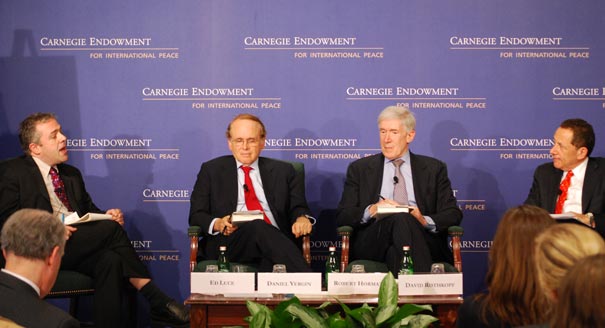Registration
You will receive an email confirming your registration.
Foreign Policy magazine and the Carnegie Endowment for International Peace hosted the launch of David Rothkopf’s newest book, Power, Inc. The Epic Rivalry Between Big Business and Government—and the Reckoning that Lies Ahead. Rothkopf presented his book, which traces the changing relationship between public and private power and looks at the implications of the rise of great private actors and the weakening of many states.
A panel discussion followed with Robert Hormats, undersecretary of state for economic growth, energy, and the environment; and Daniel Yergin, Pulitzer Prize-winning author of The Quest (Penguin Press, 2011) and The Commanding Heights (Free Press, 2002). Ed Luce, Washington columnist and commentator for the Financial Times, moderated.
The History of the Rivalry Between Big Business and Government
Rothkopf began by tracing the history of the rivalry between public and private power, noting that this recurring struggle has been prominent throughout the last millennium:
- Increasing Authority of the Private Sphere: Corporations were originally set up to serve the state, Rothkopf observed, but over time, their autonomy and authority increased. This has been particularly true in the United States, including most recently in the Clinton administration’s overenthusiastic championing of free trade and globalization, Rothkopf said. The private sector’s power culminated in the Supreme Court’s decision in the Citizens United case, which revolved around the issue of whether a corporation is—legally speaking—a person or not.
- Public Pushback: Rothkopf argued that while the Soviet economic model had too much state interference, the pendulum has swung too far the other way in the U.S. model of capitalism. Part of the problem is that when government power is rolled back, the void is not filled by liberty but rather by other power centers, most notably corporations. The current American model has shown that it is not very good at advancing state interests, and its main “achievement” is promoting inequality, Rothkopf asserted. The power of corporations and private money is also corrupting politics; over half of all the money spent by super PACs in the last six months was donated by only 200 people, undermining the roots of American democracy, he added.
- Historical Antecedents: The headlines of newspapers from centuries ago are eerily similar to those of today, Rothkopf noted. He added that society has re-interpreted and “updated” the views of many historical commentators on the public-private power balance—thinkers such as John Locke and Adam Smith—in order to justify prevailing political orthodoxies.
- Finding a Balance: Rothkopf concluded that ultimately, society needed to find a balance between the role of the state and the role of big business. Markets are very good at promoting efficiency, but they also promote economies of scale. Moreover, he added, they do not have a conscience. The state must find a way to retain its unique role and function, and make sure that its authority is not undermined.
Multiple Types of Capitalism
- A Framework of Capitalism: Rothkopf argued that the balance between public and private power will be struck within the framework of capitalism, and that the real question is which species of capitalism. In the search for that balance, it is important to look beyond America’s borders to other countries and the unique types of capitalism that they espouse.
- New Capitalisms: As the world’s economic center of gravity shifts, other types of capitalism are coming to the fore and competing with each other to provide the ultimate model for public-private relations, Rothkopf said. Hormats agreed, noting that the most prominent types include state capitalism, crony capitalism, entrepreneurial capitalism, small business capitalism, and chaotic capitalism. Moreover, he added, the competition over variants of capitalism is occurring not just between countries, but also within them.
- Government Involvement: All participants agreed that government involvement in states’ economies would increase. Yergin pointed out that in the United States, the frontier between public and private power would shift towards more involvement of the state in the economy, and corporations might become more socially conscious. But he added that American capitalism was often unfairly characterized as being unregulated, when in reality it was extremely, if not always effectively, regulated.
The Reckoning Ahead
- Necessary Changes: Rothkopf concluded that American leadership and example would not necessarily win out in the competition between capitalisms. Greater control of corporations would be needed, and corporations would have to increasingly take on a social role. The government, in turn, would have to streamline itself to become more service-oriented.
- Limits to State Involvement: Yergin noted that the shift towards a more involved government would also have its limits, as Europe’s economic problems stem from too much state involvement.
- The American Model: In order to perfect the American model, Hormats suggested that three key ingredients are needed: vibrant immigration, upward mobility resulting from a strong education system, and infrastructure (including, most importantly, information infrastructure). These three ingredients would combine to create a system characterized by security and perceptions of fairness, the two key elements of a successful system.
- International Governance: Rothkopf added that the structure of international governance was inadequate to meet the challenges of an increasingly interconnected world. Hormats agreed, noting that the institutions of global governance set up in the 1940s were not designed for a world populated by mega-corporations and NGOs. As a result, many institutions are seemingly destined to fail, and reform is desperately needed.
